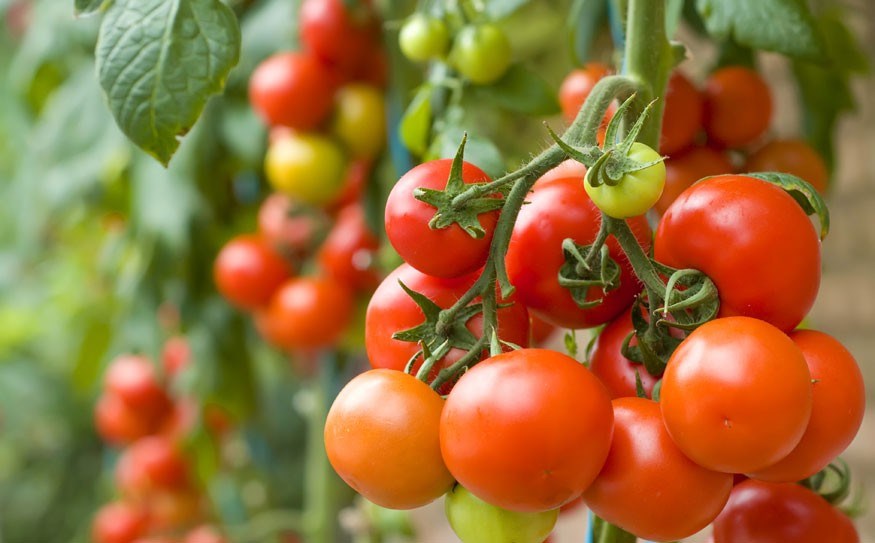Covert Farms sprawls over benchland south of McIntyre Bluff, west of Highway 97 in the South Okanagan — almost 900 acres of fruit and vegetables.
In 1959, George Covert moved his tomato-growing business from California to this undeveloped mesa. Today, Covert Farms, run by grandson Gene Covert, includes 142 certified organic acres producing a cornucopia of vegetables, herbs and fruits. Covert Farms is a major shipper of field tomatoes (and heirloom varieties), sweet onions and corn, muskmelons and table grapes (the latter to China). It supplies fruit stands, truckers and major wholesalers in Western Canada.
Visitors are welcome to this remote-feeling landscape where the great granite bluff, 500 metres high, segues down to the Okanagan River, and the stunning farm landscape includes a rustic-style store with farm products, tasty snacks and a wine tasting bar.
It's clear from chatting with the affable Gene Covert that his mind is filled with a hundred issues, from a move towards an entirely "organic and bio-dynamic" habitat to renovating a historic farmhouse.
But he particularly points to the return of sockeye to the riparian eco-system below the fields and the presence on the farm and surroundings of deer, bears, coyotes and wild sheep — even multiple species of insects and birds, snakes and bats. Everything, he says, "works up the trophic level," meaning when the soil is healthy, all life benefits.
On a brief farm tour in a pristinely maintained old Ford truck, we stop at a white-mustard covered field. From a hillside hut, says Covert, a beekeeper oversees the pollinating honeybee population. The farm also supports a dozen native bumblebee species. Of an all-organic environment, he says: "If you can replicate these policies elsewhere you wouldn't have the problem with (declining) bees."
Covert Farms, which also makes well-regarded wines under its new Covert label, is a heartening sign that conventional farming is thriving in the Okanagan, and contributing to an exceptional regional culinary culture.
One night we dined at the Terrafina Restaurant at the Hester Creek Winery north of Osoyoos. Named one of the world's 20 top winery restaurants by Wine Access magazine, it delivered beautiful dishes — in my case, roasted Fraser Valley duck breast with a local asparagus and tomato salad, followed by a goat-cheese panna-cotta dessert.
Driving north to the Kelowna area, we checked into the Bottega Inn, a large-ish, ultra-chic "West Coast modern"-style accommodation in a serene forested setting that hosts families or small groups for get-togethers and retreats.
From here it was a short drive to two more farm operations, and more assurance that while much of the Okanagan appears immersed in a heady wine culture, the growing and selling of soft and hard fruits quietly continues.
At Dendy Orchards, the cherry picking was a week away, but we talked with co-owner Christine (Pooley) Dendy, whose Pooley family established the farm in 1903. More than a century later, Dendy is a highly sophisticated operation (co-managed by Dendy's son, Neil Dendy) that ships superb cherries worldwide.
Interestingly, 70 per cent of the output go to Asia, particularly Taiwan and Hong Kong — moved from orchard to market stall in 48 hours. Cherry varieties, I learn, include Lapin, Sylvia, Sweetheart and Staccato.
Given that the cherries weren't quite ripe, we met with a trio of Poles who are contracted annually to travel from Europe to handle the birds of prey that protect the cherries from marauding bands of starlings and others cherry-loving avifauna.
Two of them, holding a falcon and hawk respectively, demonstrated how the birds swoop low over the trees. Then a grizzled-looking handler (he spoke no English) named Tommy, sprayed a distressed and over-heated falcon with water, immediately calming it.
Christine Dendy explained how research at the long-time federally-run Pacific Agri-Food Research Centre (PARC) at Summerland has helped find and develop later-ripening cherry varieties suitable to the Okanagan, thereby ensuring the product's competitiveness. She worries that a decline in federal funding for PARC research is going to harm the small and fragile B.C. cherry industry.
At the nearby Ross Farm, Theressa Ross talks about how she and husband Dave (whose family founded the farm in 1942) pioneered the province's "land-based cidery license" in 2000. In essence, the couple convinced the province that commercial cider — made and sold on the farm — could be produced with conventional apples, rather than only cider apples, as had been the practice.
Today the couple — Theressa manages the farm and makes the cider, while her husband works as a logger — produce a minimum of 4,500 litres of hard (alcoholic) cider a year and sell it under the Ross Farm label. "Cider is still a very young beverage — people are still discovering it," says Theressa, as she pours samples in the cottage-like tasting room. "This is Ross Hard Apple Cider — crisp, fresh, light."
Out in the farmyard, Theressa's hens and chicks follow her around like a beloved mother (it's a never-ending demand for grain, she notes), as her children manoeuvre their bikes through the picturesque melee. Her young son is demonstrating a real interest in all aspects of the 10-acre family farm, she reports.
Resources




